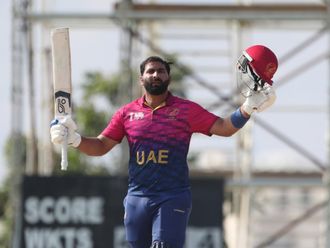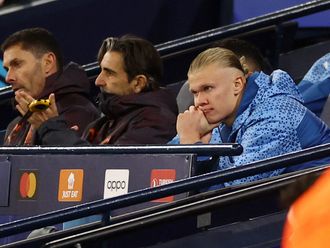Dubai: The International Cricket Council (ICC) has stressed the importance of the game being played in the right spirit during the ICC Cricket World Cup 2015, calling on all teams to uphold the sport’s integrity.
On top of issues to do with the behaviour of players, the ICC also made it clear that it will clamp down on bowlers with suspect actions as it pushes to ensure that the rules of the game are obeyed.
Special arrangement have also been made to thwart corruption and attempts of match fixing.
ICC chief executive David Richardson, in an exclusive television interview to ICC, said that “there has been no stone left unturned” in efforts to ensure that the sport’s pinnacle 50 over tournament retains its reputation as one of the most competitive and popular event in the world.
“Over the last six months, or even going back further to the last Ashes series, there have been too many examples of player behaviour going too far and overstepping the boundaries of acceptabilities,” said Richardson, who was ICC general manager for cricket in each of the previous three tournaments in 2003, 2007 and 2011.
“The amount of sledging and disrespect shown by players to each other was bad. Since then, we have done a lot of work with our umpires and match referees to ensure that they are much more proactive in terms of policing behaviour on the field and when players do over-step the mark, taking appropriate action,” Richardson added.
“Over the last three or four months you have seen 12 ICC Code of Conduct charges laid against people for exactly that — disrespectful behaviour on the field. For the ICC Cricket World Cup 2015, it will be no different and at all pre-event briefings with the teams, the match referees will be making sure that that message is delivered loud and clear,” said Richardson, who played for the South Africa team that reached the semi-finals of the competition the last time the event was staged by Australia and New Zealand in 1992.
Hoping to make this tournament the best World Cup to date, Richardson explained the ICC’s worldwide clampdown in dealing with suspected illegal bowling actions.
Though it led to the suspension of top bowlers like Pakistan’s Saeed Ajmal and Mohammad Hafeez, Richardson said: “The game realised that we had a significant problem and there were just too many bowlers, from all teams, bowling with suspected actions. So, I think we have made very good progress in identifying those bowlers, sending them off to be tested and, where necessary, suspending them until they can remedy their actions. We want to make sure that we don’t lose ground on what I think has been significant progress over the last few months.
Richardson even pointed out that it is not end of the road for those who were suspended.
“There might be one or two [bowlers] who were suspended and who are now coming back into international cricket and the challenge for them will be to make sure that they maintain their remedied action. The instructions to the match officials will be no different and these matches will be treated exactly the same as any other international match. And if there are bowlers who are bowling with suspect actions, they might be reported,” he said.
Richardson said that arrangements for quick testing had been made in Australia.
“The ICC-accredited testing centre in Brisbane is on stand-by so that if somebody is reported early on in the tournament, he can go straight off to Brisbane, get tested within five or six days, and we can have the report so that he can either continue bowling if he’s found to be legal, or if he’s illegal, then he will be suspended.”
Richardson also spoke about corruption and match-fixing threat that looms large over the sport. He credited the work of local agencies, as well as the ICC Anti-Corruption and Security Unit (ACSU), and he believes that the ICC is well-equipped to deal with these threats.
“On the corruption side, it’s safe to say we’re the best prepared we’ve ever been. Our Anti-Corruption personnel have done a lot of work in entering into agreements, associations and arrangements with the local police and law enforcement agencies in both New Zealand and Australia.”
Richardson explained how tough they have made it for match fixers.
“As the years have gone by our intelligence and information on who these corruptors are, and [those] who may try and fix matches around the world, has grown. We know exactly where these people are and we have got a list of more than a hundred names that we will be passing on to these law enforcement agencies. It will be very difficult for anybody outside of the game to come and even attempt to try and corrupt players, umpires or anybody involved in the World Cup, to try and fix a match.
The ICC has also sought special legislation to handle the issue.
“The New Zealand and Australia governments have introduced specific legislation which makes attempting to fix, or fixing matches, a criminal offence. This enables, not only us [the ICC ACSU] but the police themselves to take much more specific and direct action against these people who are trying to corrupt the game,” he said.












